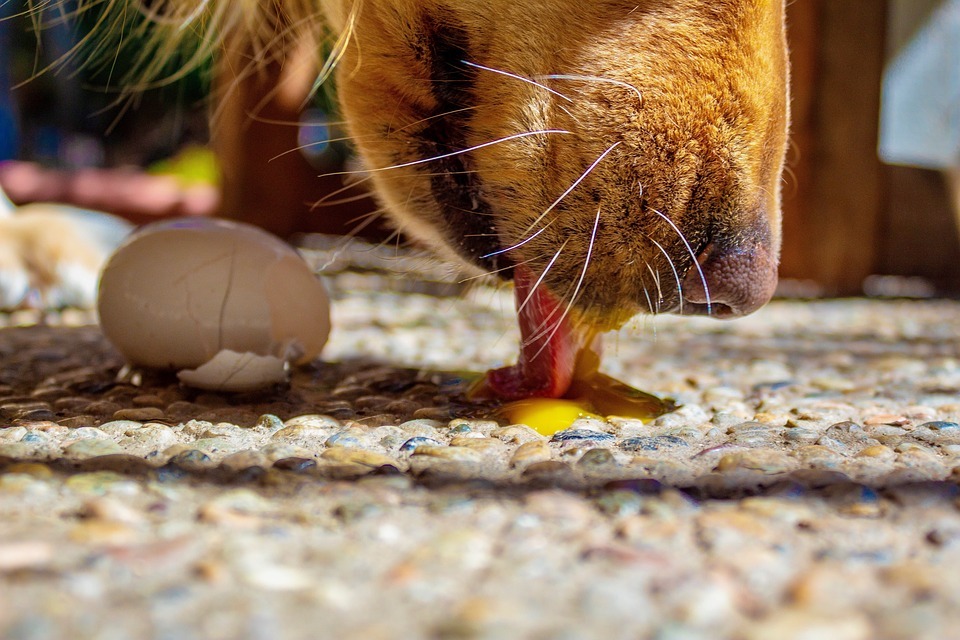If you occasionally make homemade treats for your dog, you might be wondering whether it’s safe to add a cracked raw egg over his food. Well, eggs are potent sources of a wide range of amino acids, fatty acids, minerals, and vitamins, making them a nutritious option for your dog’s diet. Nevertheless, the aspect of feeding raw eggs to dogs is shrouded by unending debate among pet owners and scientists.
People have long been worried about the potential dangers of fresh eggs, and such fears have always kept pet owners questioning the safety of including uncooked eggs in their dogs’ diets.
In this post, I will address the common controversies around the addition of cracked egg over dog food and also give you an insight into the right way of doing things.
Let’s dive in.

A Look into the Misconceptions of Feeding Raw Eggs to Dogs
The most popular controversy surrounding the inclusion of cracked raw eggs in dog treats is that you are exposing your pet to the risk of bacterial infections such as E.Coli and Salmonella. It could be due to several cases of human beings contracting infections from contaminated eggs.
However, this is not the case when it comes to feeding raw eggs to dogs. Studies reveal that the probability of a dog contracting salmonella from an egg is less than one in 20,000.
Additionally, dogs can handle bacteria more efficiently than humans. A dog’s digestive tract is shorter compared to a human being’s, which means that food gets processed relatively quickly.
Therefore, there are little chances for bacteria growth and multiplication up in a dog’s digestive system. Accompanying the short digestive tract is a highly acidic stomach that effectively kills bacteria.
Dog owners are also afraid that feeding dogs with raw eggs lead to biotin deficiency. Biotin is a water-soluble vitamin B which aids in cellular growth and metabolism of fatty acids. Biotin is responsible for health, smooth coat, and fur in dogs.
The white of raw eggs is also said to contain a chemical known as Avidin which inhibits biotin. However, the chances of your dog suffering from biotin efficiency are rare unless you make cracked raw eggs your canine’s main diet.
Still, it would take many eggs to cause biotin deficiency. Besides, the egg yolk has high levels of biotin, which counterbalances the amount of Avidin in the egg’s white.
The fact that eggs contain cholesterol has also got most dog owners worried. Whereas cholesterol is a significant concern when it comes to human health, you need to understand that dogs don’t digest foods as the human body does.
So, unless your dog is diabetic or has hyperthyroidism, cholesterol effects shouldn’t worry you when adding cracked egg over dog food or homemade treats.
Precautionary Actions to Consider
Always source raw eggs from well-reputed sources and don’t purchase chemically-treated eggs to eliminate the risk of salmonella contamination.
Limit the consumption to one egg per day or three eggs per week to reduce the risk of Avidin effects on your dog’s biotin levels.
When incorporating raw eggs in your dog’s biscuits, check if the pet experiences digestive setbacks. Cut the amount if you notice any allergic reactions.
The Bottom line
There are little chances of your pet getting affected by raw eggs, and it’s generally safe to include them into your dog’s diet. However, you cannot ignore the possibility of the occurrence of side effects, and this calls for extra care.
Include uncooked eggs in dog treats in moderation and always buy eggs from ethical and reputable farmers. Alternatively, farm chicken under hygienic and right conditions to prevent contamination.
As an Amazon Associate, we may receive a small commission from qualifying purchases but at no extra cost to you. Learn more. Amazon and the Amazon logo are trademarks of Amazon.com, Inc, or its affiliates.

